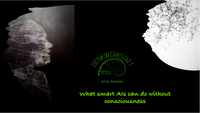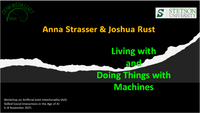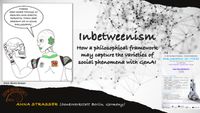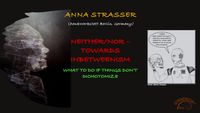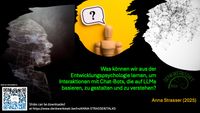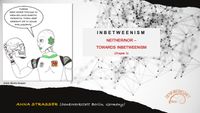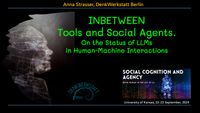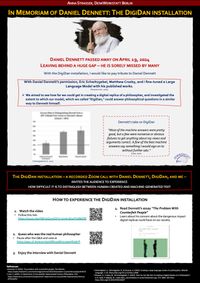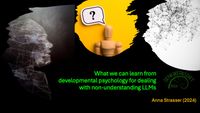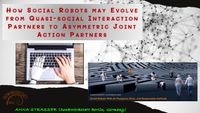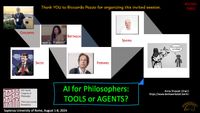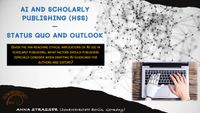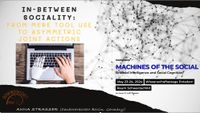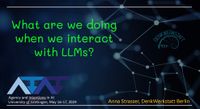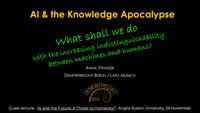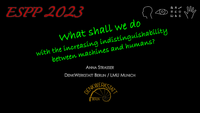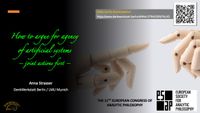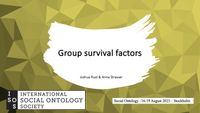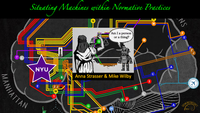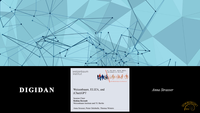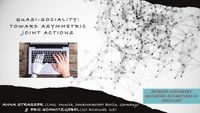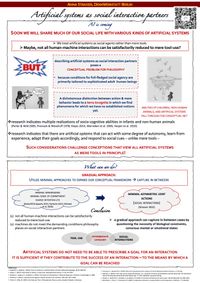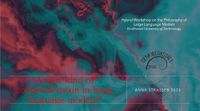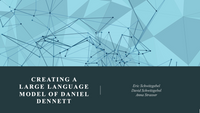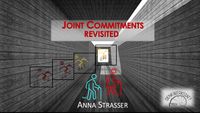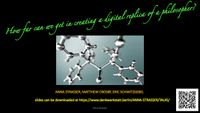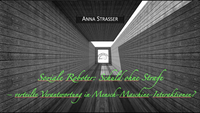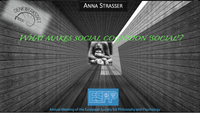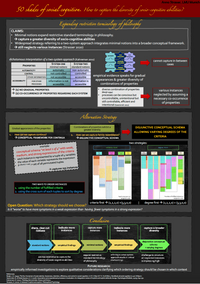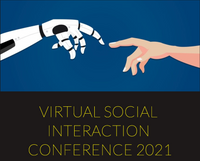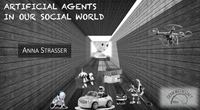Talks
| |
| |
| |
| |
| |
| |
| |
2024 | |
| |
| |
| |
| |
2024 | |
| |
| |
| |
| |
| |
| |
2023 | |
As part of the lecture 'AI and the Future: A Threat to Humanity?' by Michael Wilby, Anglia Ruskin University, 29 November | |
|
|
| |
| |
| |
| |
| |
| |
| |
|
2022
| |
| |
| |
| |
|
Fundamental Issues in Cognitive Science: Brainstorming with Dan Dennett and Friends. 1:15PM-2:15PM, Doug Hofstadter, Melanie Mitchell, Anna Strasser and others on AI and consciousness, The Center for Cognitive Studies, Tufts University, Boston (25. March - POSTPONED)
2021
| |
| invited talk |
| talk |
| talk |
| PREVIEW |
| |
| |
| |
| (SLIDES) |
| (SLIDES) |
|
2020
1. Künstliche Agenten in unserer sozialen Welt. Philosophiekreis Eberswalde, November 5, 2020.
LINK to the recorded talk in youtube
2. Coexisting with artificial agents in the realm of social cognition. ECAP10. Online Conference (Utrecht): August 24-28, 2020.
3. Social norms for artificial systems. Robophilosophy 2020. Online Conference (Aarhus): August 18-21, 2020.
prerecorded talk
4. Social norms regulating our interactions with artificial agents. Social Ontology 2020. Online Conference (Neuchâtel): July 13-25, 2020
Link to the prerecorded talk
2019
- Beware of Dichotomous Distinctions About Cognition. Academic Philosophers in Berlin, 14. Juli 2019.
- Do human anticipation abilities have a special feature, Anticipation and Anticipatory Systems: Humans Meet Artificial Intelligence, Örebro, June 2019.
- From tools to social agents, AISE, Falmouth, April 2019
- Daniel C. Dennett beim Denken beobachten, MoMo Berliner Philosophischer Arbeitskreis, Berlin, 18 February 2019.
2018
- Beware of dichotomous conceptions, ESPP 2018, Rijeka, Croatia, 10-13 September 2018.
- Asymmetric cases of joint actions, Social Ontology 2018, Boston, USA, 22-25 August, 2018.
- Reciprocal exchanges of social cues in social interactions, MeeTo 2018 - From moving bodies to interactive minds, Turin, Italy, 25-27May, 2018.
- Beware of dichotomous distinctions, Naturally Evolving Minds. Controversies, Developments, Interventions. University of Wollongong, Australia, 20-23 February 2018.
- Artificial agents in the realm of social cognition, ROBO-philosophy, Vienna, Austria, 14-17 February 2018.
- Über die Risiken eines dualistischen Denkens, MoMo - Berliner Philosophie-Arbeitskreis. Berlin, 12 February 2018.
- Maybe humans are not that special? Conference with Daniel Dennett on his work in philosophy of mind. Centre for Philosophical Psychology, University of Antwerp, Belgium, 30 January 2018.
- Beware of dichotomous conceptions, CVBE lab meeting. München, 10 January 2018
2017
- Social cognition and artificial agents, PT-AI 2017 - Philosophy and Theory of Artificial Intelligence, Leeds, 4-5. November 2017
- Ways of understanding social norms, (with Frank Esken), Norm und Natur, XXIV. Kongress der Deutschen Gesellschaft für Philosophie, Berlin, 24-27 September 2017
- Artificial agents in the realm of social cognition, ENSO V, Lund, 30.8-1.9.2017
- In defense of a minimal approach to mindreading, ECAP9, München, 21-26 August 2017
- Reciprocal exchanges of social cues in social interactions, ESPP, Hertfordshire, 14-17 August 2017
- Most minimal cases of commitments in joint actions, JAM, London, 22-25 July 2017 (poster)-cancelled
- Artificial agents in the realm of social cognition, 3rd Workshop on Virtual Social Interaction 6-7 July 2017 (poster)
- Traditional accounts do not have to feel threatened but they might be encapsulated by the two-system approach', iCog 4, Oxford, 17-18 June 2017
2016 and earlier
- Minimal approaches in between behavioral and mentalistic interpretations. Let's get minimal - humans are NOT that special', Workshop: Rational animals? Comparing human and animal minds from an interdisciplinary perspective, Bochum, 4-6 October 2016
- Do social interactions generate a special kind of knowledge? What kind of knowledge we cannot gain without interacting with others. Osnabrück, 2015: Gap 9. (Sektion 5: Philosophie des Geistes und der Kognition)
- Can artificial systems join a joint action? Towards a minimal account of joint actions of mixed groups. JAM, Budapest, 1-4 July 2015 – successful submission
- How minimal can self-consiousness be? Content or No-Content: The Role of Representations in Early Cognition, Institute of Philosophy, Porto, 15 June 2015
- From Skillful Action to Reflective Thinking. The nature and origins of human cognition, Berlin, 17-18 June 2015
- Do social interactions generate a special kind of knowledge? University of London Research Day: Acting and Interacting Bodies, London, 2 June 2015
- Social Cues matter. Reciprocity and social cognition, Berlin, 23-25 March 2015• Mental states without brains? Thinking (about) groups. Conference on Collective Intentionality and Social Ontology. Copenhagen, 8-10 October 2014
- Can artificial systems be part of a collective action? Summer School on 'Shared experiences'. Aigina, 23-28 June 2014
- Can artificial systems be part of a collective action? Collective Agency and Cooperation in Natural and Artificial Systems, University of Stuttgart, 22-24 July 2013
- How is it possible to develop a delusion. Schizophrenia: Levels of Interpretation Subpersonal, Personal, and Interpersonal, University of Memphis, 25-26 October 2012
- Bridging. Schizophrenia & Self-Consciousness, Berlin School of Mind and Brain, Mai 2011
- Skills and Concepts. Colloquium Prof. Albert Newen, Bochum
- Philosophy of Learning (with Ellen Fridland), Pauen Colloquium, Berlin School of Mind and Brain, Berlin, 2010
- “What is AI?” (online questionnaire), International Joint Conferences on Artificial Intelligence (IJCAI 01), Seattle
- An Interdisciplinary Notion of an Action. 4th ICCS/ 7th ASCS-2003 (Joint International Conference on Cognitive Science) Sydney, Australia
- Wer erinnert was? Lecture series: Erinnern und Geschlecht, Freiburg – invitation
- Voraussetzungen für eine Theory of Mind. Kolloquium Uniklinik Freiburg, Abt. Psychiatrie
